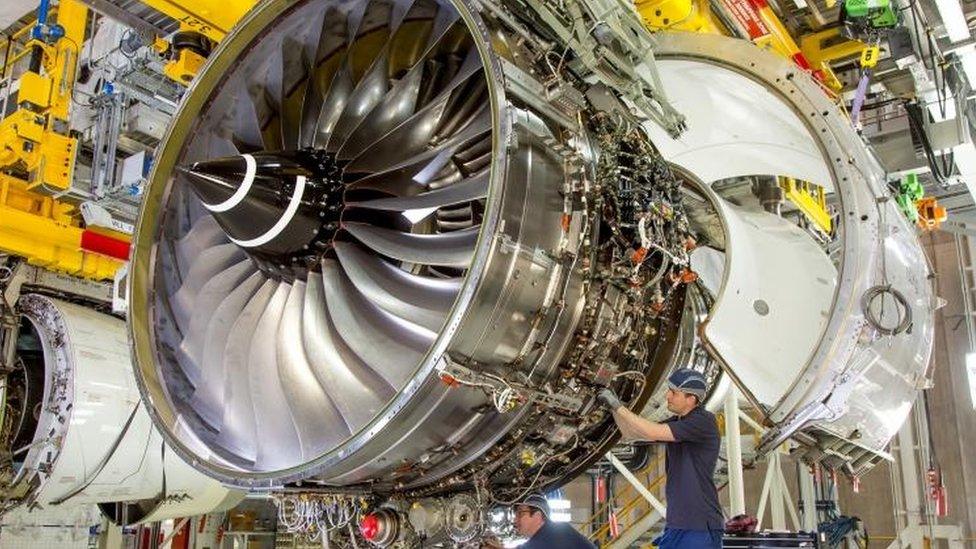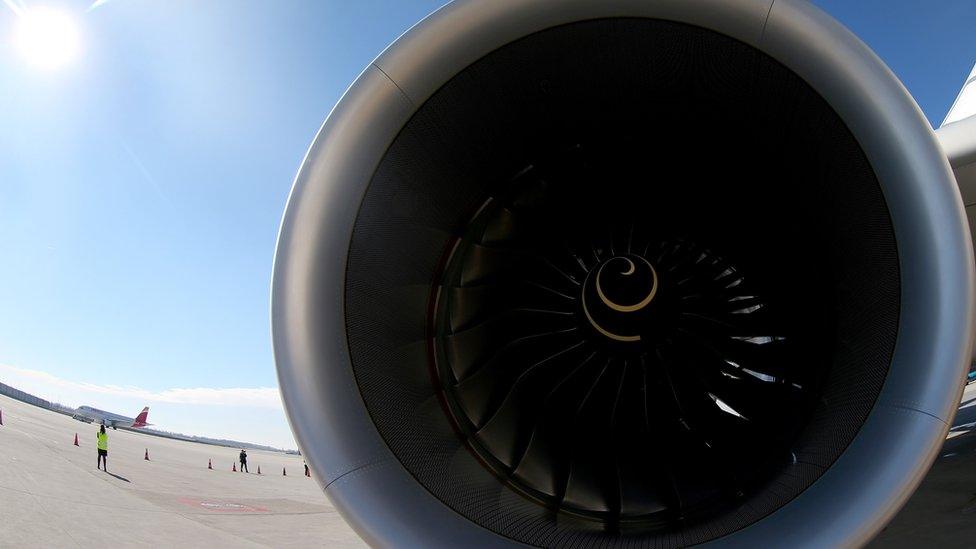Rolls-Royce warns Osborne over cuts to research support
- Published
- comments

How valuable is a sizeable engineering firm to the UK?
Rolls-Royce, which makes and maintains aircraft engines and supports submarine engineering for the offshore oil and gas sector, suggests the answer to that question is - very.
The company directly employs more than 21,000 people in the UK, 9,000 of whom are engineers; the kind of high-value, highly technical jobs that the government is keen to promote because such jobs are hard to replicate abroad and enable companies to make things the world wants to buy.
Like aircraft engines.
Rolls-Royce's own figures reveal that the UK division of the company generates annual sales of £5.7bn, 75% of which comes from exports.
That's about 2% of the UK's total goods exported.
So, when the chief executive of the company, Warren East, reveals that he has been in touch with the chancellor about tomorrow's Autumn Statement and Spending Review it is worthy of note.
Mr East's concern is simple - if the government cuts grants for business and scientific research and development then it will have an effect on Britain's engineering future.
"It does have a negative impact on the [engineering] ecosystem," Mr East said.
"It is bound to be a headwind on jobs at some stage, particularly if there is a positive impact [from research and development grants] from other parts of the world."
Grants to loans?
It is clear from speaking to Mr East, Rolls-Royce will put investment where government support is most forthcoming.
The Department for Business, Innovation and Skills, which oversees grant support, is under pressure to find 20% of savings in its £18bn budget.
At present £500m worth of grants are distributed by Innovate UK.
Many believe they could be a target.

One plan is to turn at least some of those grants into loans, moving the costs off the government's balance sheet and onto the balance sheets of the recipient companies in the form of debt finance.
And thereby creating a revenue stream for the government.
Mr East argues that much of the money granted, for example, to Rolls-Royce, goes straight to fund university research - and therefore is not a good target for loan repayments.
Rolls-Royce also says that the government's direct grant investment is significantly boosted by the businesses which receive the money.
"For every £1 [that flows] from the government into industry, we add £17 of investment in research and development, capital expenditure and training," Mr East said.
"It is a good channel for them."
He said that the grants support the development of valuable intellectual property (Rolls-Royce alone applies for 600 patents a year) and the maintenance of a skilled engineering base.
Without the grants such skills could "leach away", he said. Mr East will hope that Mr Osborne will have better news on research grants than many predict.
Profit warnings
He has, of course, other issues on his plate beyond research support from the government.
Over the last year, Rolls-Royce has announced a series of profit warnings as aircraft engine orders have stalled and oil majors and emerging market governments - buffeted by the falling oil price - have cut back on offshore production.
Investors are nervous that a business with a complicated reporting structure - some say opaque - has little visibility of future risks to the firm.
And finds it hard to respond.
Mr East has pledged to make Rolls-Royce more transparent, less complicated (it has 27 different management structures dealing with "technology", a number he would like to cut to 8) and faster at reacting to changing global markets.
He also admitted that further "revisions of expectations" cannot be ruled out given the "mud in the system". That's short hand for further profit warnings - although Mr East insists that at heart Rolls-Royce is a strong and highly profitable business.
Rolls-Royce wants to find savings of up to £200m a year, which is likely to mean job losses, particularly among senior managers.
We will hear more about that next February when Mr East completes his review.
By then he may also be dealing with a cut in research and development support from the government, worth at the moment £33m a year.